#but this is more contextually relevant
Explore tagged Tumblr posts
Text
My Thoughts: Young Sheldon 7x02 A Roulette Wheel and a Piano Playing Dog
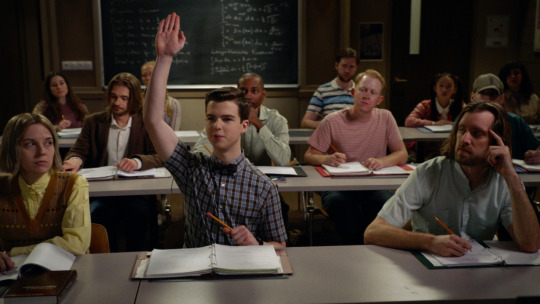
Look how cute he is! Cute as a button! 😙 Awwww! Baby! It is so difficult for me to watch Sheldon struggling. Imagine being a fish out of water your entire life where your one socially acceptable trait is your intellect, which surpasses everyone’s, only to be thrown into A WHOLE OTHER COUNTRY, taking the fish metaphor to a whole other level, only to discover THE one quiver in your arsenal is utterly moot.
Damn. My poor baby string bean! But he handled it so well. He pushed through! I am proud of my Shelly! It is the aspect of why YS is better than TBBT because they allow for Sheldon to be a more complex individual and don’t treat him like a child, even though he is literally a child. The show allows circumstances to push against him, to make him stronger, and the narrative isn’t constantly belittling him as if he can’t handle life at all. It is actually quite a big deal that Sheldon was able to keep his mouth shut and humbled himself under an authority in order to learn what he needed to. And he did this by HIS choice! He listened to what those around him where telling him, and chose the wiser path. He didn’t have to be coerced, manipulated, or browbeaten into it, which was often the route TBBT took.
Well, his tutor DID use physical reinforcement, but a wrap on the hand is good for the boy. 😁
Which brings me into my next thought, I don’t think this moving back and forth from Texas and Germany is going to work really well for the storytelling. I want to see how the whole Cooper family is doing, of course, but I am primarily watching this show for Sheldon! I don’t feel like they are able to spend the amount of time necessary to really explore this experience he is having. It feels so rushed. I don’t like it. I want more time to process Sheldon’s life lessons here and how he is feeling about it. It is the same old story! This is literally one of the biggest problems with American media.
They. never. give. enough. time. to. the. story. EVER. !!!!!
🤦♀️ Why are you the way that you are, American Media. I hate so much everything that you choose to be.

Anyway, I did love the heart to heart chat between Missy and Georgie this episode! That was so sweet! They are learning what it means to have responsibilities and that growing up requires so much thankless sacrifice. I love the bond that Missy and Georgie have, and I am glad we got to see them process this experience together. And way to go Missy for not only stepping up, growing up, and being so mature and on top of things, but she also is learning about boundaries! Damn girl! 🔥 I know Mary Cooper loves serving her family so I love that aspect about her, but the boys definitely shouldn’t leave all the house stuff to the women folk, as if they have to be served and waited on. Missy is killing it! 💪

Missy and Sheldon, two sides of the same coin! I hope to talk more about that later! 😉 Now it’s time for...
My Favorite Sheldon Cooper Quotes: Sheldon: "And they laughed at me for not knowing something they knew! Who does that?!" Mary: ". . . you do." Sheldon: "This is no time for a teachable moment! Your child is hurting." Mary: "Sorry." *pats him on the arm* "There there." Sheldon: "I guess that'll do. Now how about a hot beverage?" Mary: 😑
Sheldon: “Oh! I see the problem! This is stupid! You can’t just invent dimensions. There is this one, this one, and this one.” Mei-Tung: “You forgot the dimension of time.” Sheldon: . . . Sheldon: *holds out his hand* Mei-Tung: *slaps it with a pencil* Sheldon: “Ow! . . . Thank you." Sheldon Prime: "I wanted to give up and runaway. But I had read enough comic books to know that heroes don't quit. Instead of running I decided to stay and face the biggest challenge I've ever had: keeping my mouth shut. This turned out to be a pivotal moment in my life. By being open to people smarter than me, I grew as both a man and a scientist. Humble. Brilliant. I really am the whole package!"
#and the boy's not wrong#sheldon cooper#young sheldon#my thoughts#my sheldon cooper thoughts#I loved the piano playing dog reference#although the dog reference is unfortunate#I hated when TBBT compared him to a dog#but this is more contextually relevant#iain armitage#missy cooper#the cooper family#7x02#A Roulette Wheel and a Piano Playing Dog#yes I used an office reference in a young sheldon review
27 notes
·
View notes
Text
oughta nap but speaking of comparing bsol & xmas holding hands kissing w/tongue drawing on such You Know, At Least Well Enough, What It Is genre conventions & going wild playing w/them but in earnest, the heart of whatever xyz was used to get at is fairly embraced....all i wanna say like obv lo cocodrilo in his element is so xmas villain. 100% this bitch "i am such a bastard >:)" vs "i'm such a dirty little dastard >:)" needs no introduction & is here to tell you to go fuck yourself & maybe that he'll kill you & maybe does kill you & so on. brazen with it & he ain't kidding neither &c
#cocodrilo is also at all more grounded which one might expect just off the bat; many things have some more Drama than xmas xtrav#but naturally this is just relevant up to plot & genre differences & that like lo cocodrilo is Not fully in his element for the most part#all of act two contextualized like well he's genuinely upset about all of this one; so here we are#bsol#joe iconis christmas extravaganza#kind of the long lost child but it's also like oh this one that's been right here this whole time? hmm yeah i guess#also the comedically unexpected flexibility & range of both bsol & xmas villainy. can have a nice chitchat w/them for a bit perhaps
1 note
·
View note
Text
The Wicked Movie is one of the most politically, socially and contextually layered modern movies to ever be made. It is so relevant for the current times we are living, it’s literally a direct commentary.
And I will stand on that fact till the end of time.
Witches are rooted in antisemitism. Everything about the stereotypical witch was a Jewish stereotype. Idina Menzel is Jewish. Her being cast was a direct commentary on it. Cynthia being cast also brings to light how Elphaba is commentary on how society STILL treat black women/women of color.
That’s why Glinda’s eyes are green in the original poster for the musical! You have to be eagle eyed to spot it, but it’s a small detail that shows “Good” people…are probably more evil than the people in society that are being labeled “evil”.


#wicked movie#wicked musical#wicked the musical#wicked#wicked witch of the west#glinda the good witch#elphaba thropp#glinda upland#film and television#social commentary
459 notes
·
View notes
Text
if youre going to ask someone on tumblr what a word they used in their post means you should have to provide a notarized affidavit confirming you googled it alongside relevant contextual terms and looked at three or more results from the first two pages before doing so and if you can't someone comes to your house to compact your computer into a funko pop
780 notes
·
View notes
Text
How to Write an Image Description: A Fundamental Guide.
[Plain Text: How to Write an Image Description: A Fundamental Guide. End PT]
General Guidelines:
[PT: General Guidelines. End PT]
Object, Action, Context
[PT: Object, action, context. End PT]
This is what you want to prioritize. What are we looking at, what is going on, and what is the surrounding environment?
Keep it simple and get to the point
[PT: Keep it simple and get to the point.]
Try to use short, clear sentences and prioritize what the reader needs to know in the context of the post. We don't need to know that the tweet was posted at 2:08AM or what color rings someone is wearing. That doesn't really provide useful information. If you really want to provide some relevant details, be sure you get to the main point of the image first.
Context is Important
[PT: Context is Important. End PT]
Why is the image posted there? What information does it lend to the content around it? Make sure the viewer knows what they need to know to understand how the image relates to the text and content partnered with it.
For a meme or a tweet screenshot, we don't need to know all the details or what the background looks like, we just need to understand the joke. For something like art or photography, you may want to include more details.
Don't Assume
[PT: Don't Assume. End PT]
Don't assume gender, race, and pronouns of the subject(s) of the image. If you can find this context in the post, on op's blog, or somewhere else you can include it, but try not to make baseless assumptions.
Alt Text vs Image Descriptions
[PT: Alt Text vs Image Descriptions. End PT]
Alt text is great for people using screen readers, but it isn't always the most accessible option. Alt text can be glitchy, the font size cannot be changed for those who need large text, and it doesn't show up at all until the image either loads or completely fails to load.
For this reason, a longer description in plain text in the body of the post is a more accessible option.
I suggest a short summary in the alt text so people can get the overview of an image and a longer description in the body of the post. For example, compare the image description and the alt text for the following image:

[Image ID: A guide to writing alt text on images. At the top, it says "Writing Alt Text" in big white text. It then lists off five major steps to writing alt text. Identify who, expression, description, color, and interesting features. It then shows an image of a capybara, with a sample alt text that reads, "A capybara looking relaxed in a hot spa. Yellow yuzu fruits are floating in the water, and one is balanced on top of the capybara's head." with each block of text color-coordinated to show which of the five steps it corresponds to. At the bottom of the image is the word "Puzzle" stylized into a logo. End ID.]
The Alt text provides the bare minimum of what you need to know to contextualize the image, while the ID expands on details that help to understand it and provides more details.
Formatting:
[PT: Formatting. End PT]
Try your best to use correct spelling and grammar, but transcribe accurately. Use clear language and concise sentences where possible. However: Don't censor words or correct spelling when transcribing something from the image. You want the description to be as accurate to the image as possible.
[PT: use correct spelling and grammar, but transcribe accurately. End PT]
Always use plain text. Never use formatting like bold, italics, other fonts/font sizes/text colors, or text in all caps. If they appear in the original image, transcribe it in plain text like this:
[Bold, underlined] Always use plain text. [End bold and underlines.]
Begin an ID with square brackets [[these]], followed by "ID:" or "Image:". End the description with "End ID" and a closed square bracket ] to signify the end of the descriptions.
Screenreaders and visually impaired people sometimes struggle with symbols and emojis. Transcribe these instead when possible!
[PT: Transcribe these instead when possible. End PT]
The image description should be directly after the image, before any post caption or commentary.
Never use a readmore! If you delete the post or change your url the description is gone forever. It also makes the ID harder to reach in general, which is not accessible.
[PT: Never use a readmore! End PT]
Make your post accessible from the start if you can. Don't post something without an ID then reblog it with a description so that people have a chance to spread the inaccessible version of the post if they "prefer" the one without the "clutter" of an ID. That's ableist. If you post something without a description then end up describing it later, edit the ID into the original post.
[PT: Make your post accessible from the start. End PT]
Resources:
[PT: Resources. End PT]
The People's Accessibility Discord Server: I will always suggest this server! It's full of people that can help write descriptions, give feedback on IDs you've written, answer questions about accessibility, and more!
Online OCR: Image(/PDF) to text converter! This is really helpful, especially for transcribing text in tweet screenshots, article excerpts, etc. You will still have to do a bit of work formatting and correcting things sometimes, but it's a really helpful tool
CaseConverter: Good for converting lots of text in all caps for plain text transcriptions.
Meme Image Descriptions: This google doc has descriptions of many common meme images and templates!
Some simple Image Description formats: tailored largely for replies and screenshots from social media.
WebAim: A whole website for web accessability!
Online Accessibility Masterpost focusing on image descriptions from tumblr user @anistarrose. This has a ton of good resources, reading, and tips!
Reading & Guidelines:
[PT: Reading & Guidelines. End PT]
Cooper Hewitt guidelines for image description: This focuses on describing art, but it's a fantastic resource. It gives a good description on the distinction between alt text and long descriptions and gives guidelines for each. It's a pretty concise and easily comprehensible read with a lot of good tips towards the end.
Medium's How to Write an Image Description: Concise and helpful. The origin of "object, action, context".
Diagram Center Guidelines for Image Description: I really suggest reading through this. It gives a much more comprehensive understanding of what is important when writing a description and has different sections for help describing all sorts of things like photos, art, comics, diagrams, charts, math, chemistry, and more! A longer read, but it has a lot of specifics.
Perkins School for the Blind how to write alt text and image descriptions: Another great resource! Concise and helpful, shorter than Diagram Center's articles.
SiteImprove's Alt Text Best Practices: Focuses on Alt text not long image descriptions
Last Call Media- Accessible Comics: Great info for describing comics!
American Anthropological Association's Guide for creating image descriptions: an additional resource on IDs just because
Some tips from Tumblr user @keplercryptids! I reiterated a lot of these points here, but it's still a very helpful post!
General guideline from @can-i-make-image-descriptions and @accessibleaesthetics
Alt Text and Image Description Guide by @brownandtrans
Huge list of blogs that post accessible content!
And another google doc of accessible blogs!
If this post was too much information to read and absorb all at once, I suggest reading the first two links as well as some of the last few links that lead to Tumblr posts.
[PT: If this post was too much information to read and absorb all at once, I suggest reading the first two links as well as some of the last few links that lead to Tumblr posts. End PT]
Those probably have the most concise and easily digestible information, so choose one of those. If I've said anything incorrect in this post, please let me know so I can correct it ASAP! Thanks so much for reading and happy describing!
#accessibility#accessibility tips#accessibility resources#id resources#image descriptions#resources#accessibility awareness#mod batz#i spent soooo long on this but it feels too long for anyone to pay attention to..... ah well......#disability pride month#online accessibility#long post#fuck i meant to queue this
576 notes
·
View notes
Text
"what if deltarune is about the relationships between people and fictional characters" "what if the video game interface is diegetic/narratively relevant" "what if the video game creates new universes/connects different universes to each other" enough. what if I told you something beautiful.
gonna say something controversial here, but I think sometimes undertale/deltarune theorists could really benefit from reading homestuck. considering toby fox's heavy involvement in homestuck (and the community surrounding it) I think it's undeniable that hs is among his influences as a writer, and at a certain point in an ut/dr theory video analyzing nested fictions and 4th wall multiverses and video games as a meta-narrative tool about fiction or Whatever I just feel like... maybe just knowing about sburb alone would help somewhat in predicting where deltarune has the potential to go. at least if these theorists are correct in some of their base level opinions. idk.
#not that I think deltarune is going to be homestuck 3 or anything obviously.#I just think once you start citing scp stories in ur youtube video youre in deep enough to cite something a bit more contextually relevant
69 notes
·
View notes
Text
"something floral": literature student blabbering about the usage of flower symbolism in "nevermore", how it ties to the theme of insanity and a little bit (a lot) about shakespeare.
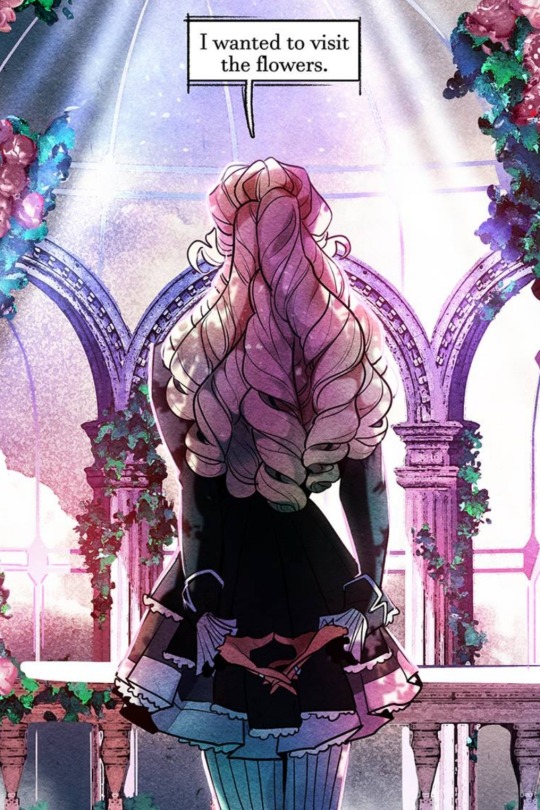
from lenore's perspective, flowers are closely associated with isolation caused by her trauma and supposed "hysteria". floral pattern wallpaper accompanied her loneliness for days, months, even years. image of the flowers signaled that lenore's position would remain unchanged, that she was stuck, that she would continue to slowly loosing the clarity of her mind.
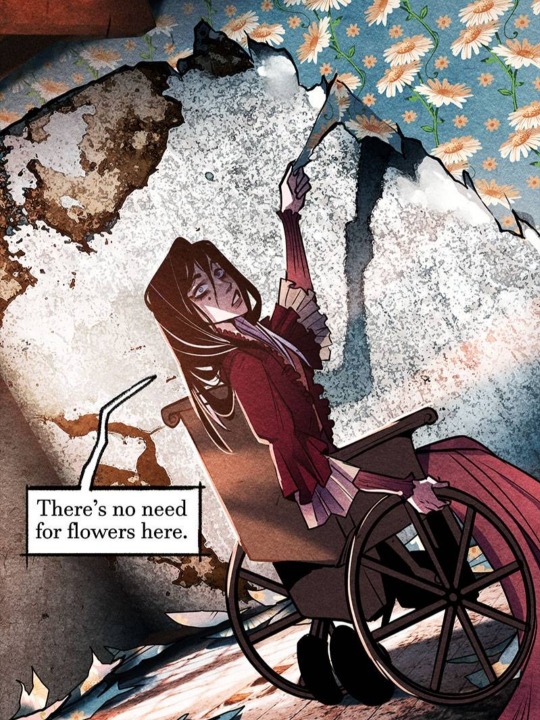
having torn the wallpaper off the walls, lenore believes that she will never see this image again, but flowers continue to accompanying her. lenore sees them again during her first meeting with annabel lee. and during the last one, too. she may have managed to get out of her lonely room, gain more strength in her legs, find a new friend, but lenore is still trapped. she's the daughter disowned by her parents, a stain on the family reputation that must be hidden forever. the image of flowers doesn't let her forget about it.
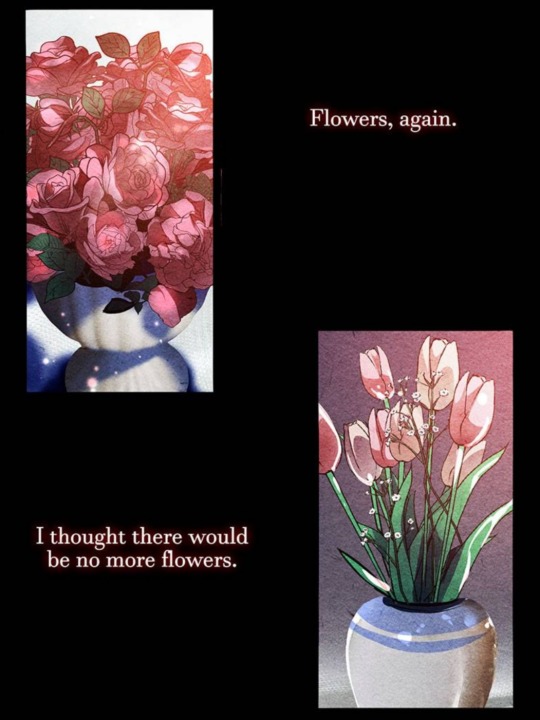
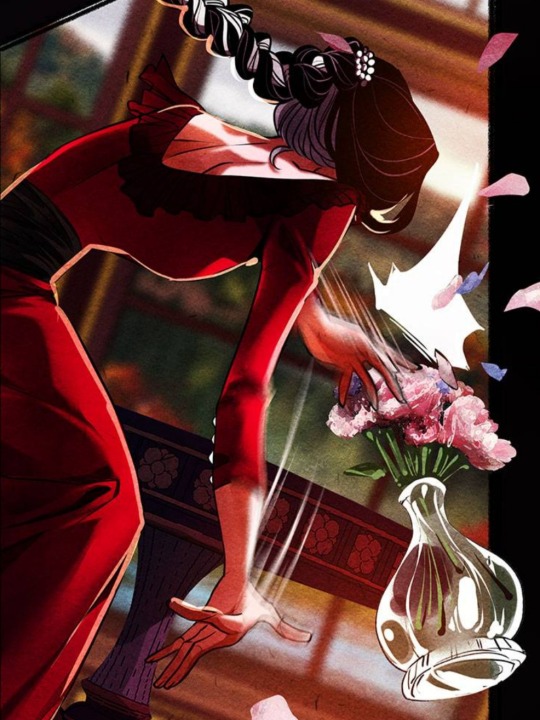
similar symbolism is also not alien to annabel lee. episode 66 is interesting in particular, because it directly quotes ophelia's monologue. I'm a big fan of shakespeare, it was he who instilled in me an interest in floral symbolism. a year ago, for a conference on foreign literature, I wrote an article about flower language of "hamlet". it's not available in english, but I'll list down some points that I considered relevant regarding "nevermore".
• rosemary can serve as a keepsake between lovers and also between the dead and the living. it could be seen at both weddings and funerals. in the old days it was also believed to be helpful in mental illnesses treatment.
• pansies, just like violets, symbolize innocence and devotion. ophelia doesn't consider the people around her worthy of violets, since she blames them for the death of her father.
• rue is a symbol of eternal suffering; grieving over her murdered father and the loss of her beloved hamlet, ophelia leaves some of the flowers for herself.
• the image of daisies has a close connection with the concepts of innocence, fidelity and eternal love. in shakespeare's tragedy, this symbol is overshadowed by the fact that in the world around ophelia there's no place for these beautiful things. for "nevermore" the symbol is also not so positive, since the readers are already familiar with daisies. they were on that wallpaper in lenore's room.
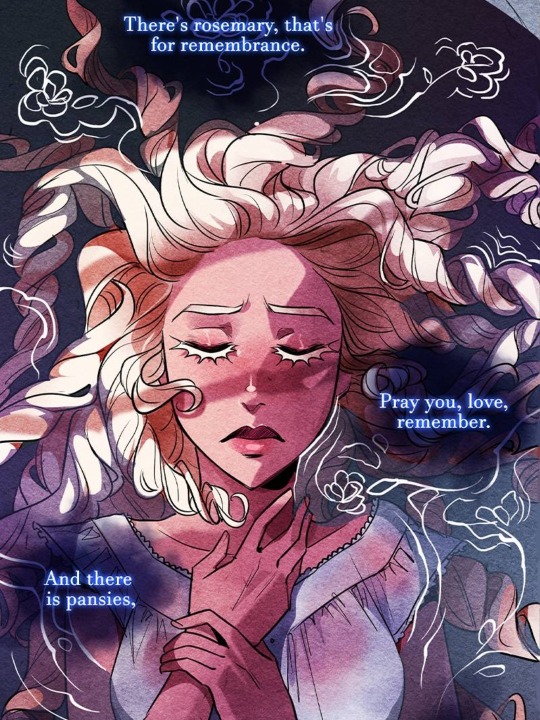
it's impossible not to note that annabel lee recites the monologue while in the bath, in the water. ophelia decides not to resist the river flow. her life turned into a tragedy: she was left without a father, her lover has seemingly lost his mind. her own sanity is also called into question. ophelia sings cryptic songs, goes into the field to weave a wreath, gives flowers to other characters. in the eyes of those around them, hamlet and ophelia seem crazy, while being the only sane and honest people among them. there's no place for tender, innocent ophelia in a cruel, deceitful world, so she drowns.
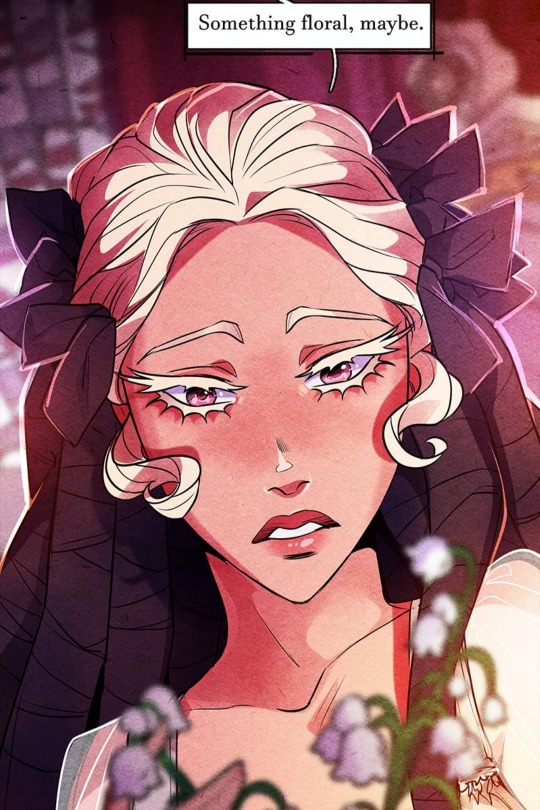
annabel lee also reflects on how both she and lenore are considered madwomen. her meeting with "leo" is accompanied by floral pattern on the annabel's dress. their madness is contextual, they both are perfectly sane, but don't fit into the system that could be leading to real madness with time. "all madwomen die twice. at least twice".
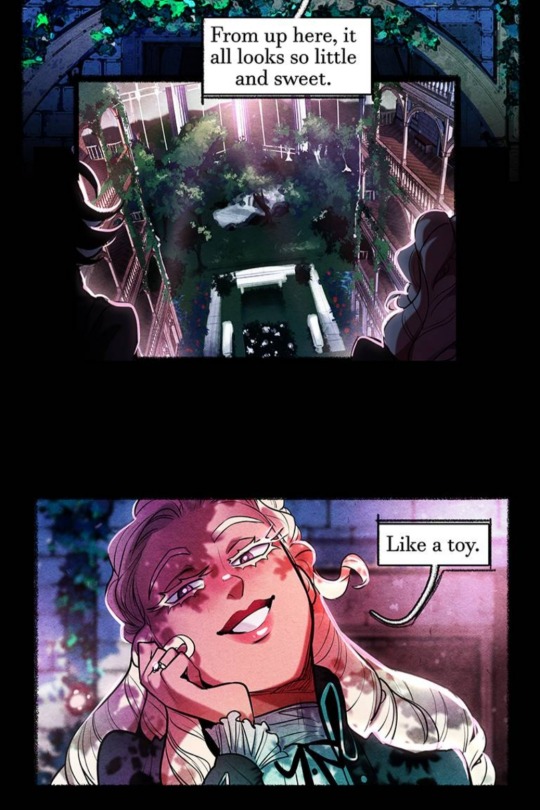
now about the arboretum. it obviously has a lot of flowers, but in my opinion this place is interesting in a different context. lenore and annabel visited the arboretum twice to discuss upcoming plans and such, and there are many parallels, both visual and narrative. not much time has passed since last time, but their situation has changed. they seem to look on their past selves from the upper level, having their conflict more acute now. I'll make a more detailed post about it later.
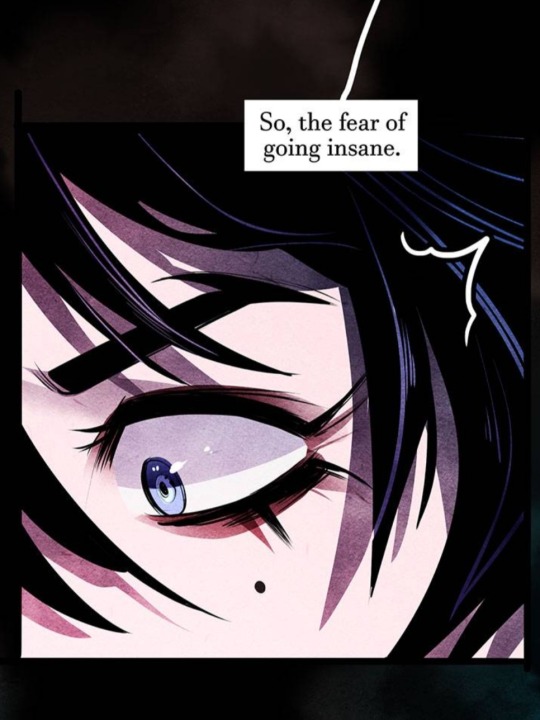
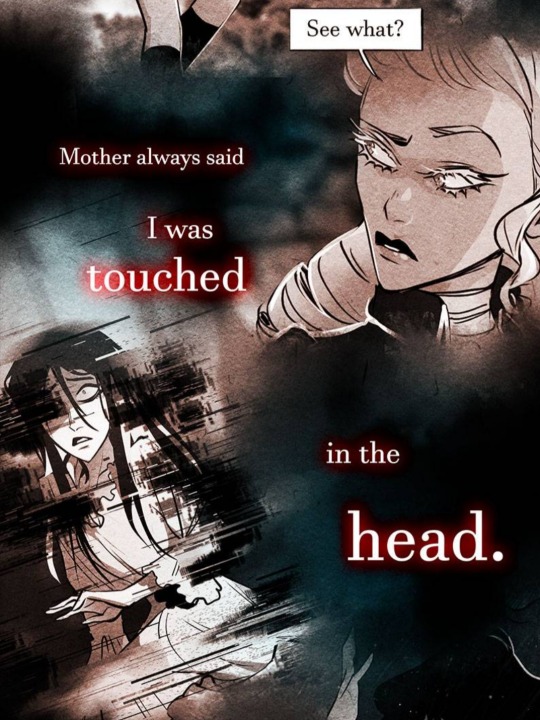
and now I'll just focus on how the characters in this arboretum full of roses behave as lost and confused as in the phobia-inducing flower labyrinth from earlier episodes. “the closer you get to beautiful flowers, the closer you get to their thorns,” says duke in episode 38. the flower imagery haunting the main characters doesn't let them forget that their sanity is always on a verge of slipping. and once a flower falls from its stem, it cannot be fixed.
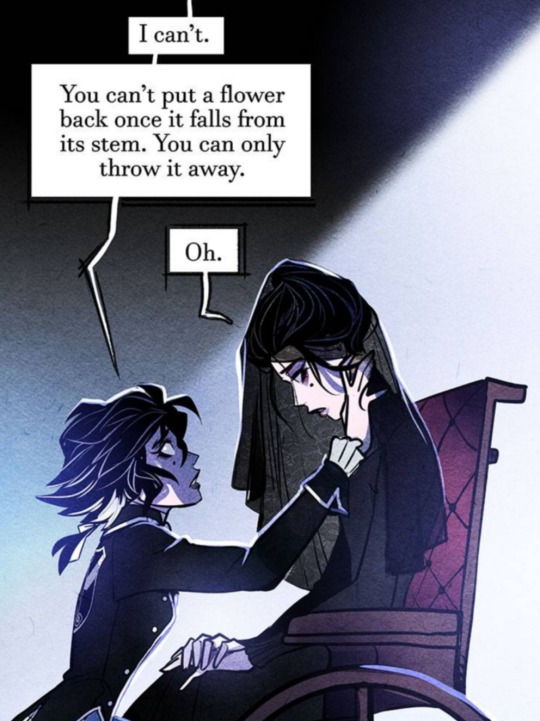
p.s. guess which writer’s works I chose for a new article this year?
#nevermore webtoon#nevermore theory#am i a total loser for spending so much time on this post#yeah absolutely#but im glad i got to share my thoughts#lenore nevermore#annabel lee nevermore#annabel lee x lenore#nevermore webcomic
381 notes
·
View notes
Text

I still have tons to say about the Garashir Goes Canon™ moment in Lower Decks so here is my big meta post about it! Below the cut is a meta discussion about the penultimate Lower Decks episode, contextualizing what it means for something to become canon.
To be clear, this is a mostly positive post with analysis included. You’ll see lots of love for Garashir and Lower Decks and also oodles of fandom meta below the cut, since we have a complicated relationship with Paramount. My analysis and graphic is based on a recent lecture about Star Trek canon I gave at KiScon!
First, I have to say that both Unification and this Lower Decks episode following mere weeks after of my lecture panel at KiScon titled Fuck Paramount, about what Star Trek canon really is and what its place is in relation to us as slash fans, is absolutely mind-blowing timing. I wish everyone in both the K/S and Garashir fandoms had been able to attend it because it was absolutely designed to serve as a framework for both of these major fandom moments. And also it was just funny as hell. But most importantly, it was relevant, and existed to give us a sense of understanding when navigating Paramount hell, particularly when they play Gay Chicken (will they, won’t they — most of the time, they won’t).
Since not every single Star Trek fan on this website was at KiScon last month, I want to expand on that a little more here, this time in Garashir context, since last time it was centered on K/S, though Garashir came up several times! When I was giving my lecture, I asked the audience what it would look like if K/S were made canon tomorrow. Everyone had different ideas—but the most common theme that came up was sheer distrust of Paramount doing it justice.
For those of you that are reading this, the thesis of Fuck Paramount was that you as a fan and a viewer have more control over what is and isn’t canon than you think, and that our role as fans is to take ownership of our stories back from corporate interests. I also developed a four-sided framework to describe how we interact with canon to take power back and make sense of canon. Both Unification and the very, very fresh Lower Decks episode have already been controversial for a number of reasons, the primary one they share being: “Wait… does this make this canon?”
So far it looks like the main reactions for this Lower Decks episode (especially considering how sudden and late in its run it is) are mostly “HOLY SHIT THEY REALLY DID IT” and “I AM DISAPPOINTED BY THE MERE SCRAPS.”
And my position on it is that both of them are completely reasonable reactions that don’t contradict one another! I’m going to make the case for both sides as I try to explore the implications of this episode with respect to the episode’s subtext, corporate storytelling, and so forth. I’m not going to go too much into the academic aspects, but I am happy to make the original slides available for anyone who is curious about my canon analysis framework.
Why It’s Enough
On one hand, this episode is done well. Undeniably. It’s a lot of fun. I have also said many times before that the only way I’d want K/S or G/B to become canon is if they suddenly randomly drop the info that they were married and don’t bring it up again, because otherwise they might do more harm than good! This was an example of it done incredibly well, in my opinion.
This episode serves as all the confirmation you could possibly really need of Garashir. Yes, there are quite a few gimmicks involved—it’s all AU, all the way. Garak is now a surgeon from another dimension, and Bashir is from an entirely different dimension, and also not really himself, but a hologram. Here’s how they’re introduced:
WILLIAM BOIMLER: “Elim Garak, a brilliant Cardassian Surgeon—and his husband, an emergency medical hologram based on Dr. Julian Bashir.”
What I really love about this moment is that it actually does more than it looks like it does, at face value. For most of us, our first instinct is to go, whatever, he’s based on Bashir, he’s not even the real one! But what they did here was brilliant—it serves as implicit confirmation that our man Bashir is also bisexual, and loves Garak. He is indeed not a corporeal human being, but as the DS9 episode where the LMH is designed based on Bashir tells us, the hologram is designed and based on who he is. It has his personality traits. Interviews are conducted to make sure that the hologram is as authentic and true to the real thing as possible:
O'BRIEN: “You mean this programme is going to have all of his personal likes and dislikes?” ZIMMERMAN: “That is why we bother to choose a human template in the first place.”
William Boimler, from the prime Star Trek universe, doesn’t say the EMH is based on some Bashir, he says this one is based on Dr. Julian Bashir. Again, this serves as clear confirmation that he is modeled on recognizably the same character from DS9. They’re not that different in essence from their prime universe counterparts, or it wouldn’t be fun for the writers or the audience. We learn that Garak is still former Obsidian Order. They are still the same people, in essence. They may be AU characters but the point is for them to be similar to the originals, or they may as well just have been some guys!
The important thing, for me, is that it’s a clear, unambiguous acknowledgement. It’s played straight. Well, not straight—but not as some elaborate joke or filled with contempt. It doesn’t tease and doesn’t dance around the issue and wink and nudge, begging the viewer to question whether or not they’re together. That much is made immediately very clear. In the episode, AU Garak and AU EMH Bashir are a married couple, and they kiss. Every moment of their relationship is sincere, the comedic moments being not about the fact that their relationship exists, but about the dynamics it brings to the story. It also tells us very clearly that they’re not even from the same universe, and that their compatibility remains nonetheless:
HARRY KIM: “Are they from the same reality?” CURZON: “No, but they love to brag about how statistically unlikely their marriage is.”
Again, I tend to see this as a positive nod to the compatibility of these characters rather than a brush-off that says the prime universe Garashir couldn’t be together. And then Garak tells us his universe’s Bashir is like the original: still a racquetball player and competes with Chief O’Brien—again, revealing quite a bit.
And the B-plot is about them squabbling, acknowledging very clearly to us that Cardassians really do just love flirting via argument, which serves as a brilliant nod to everyone who complained for three decades that the DS9 writers never really admitted that Bashir and Garak were just flirting. Finally! The writers seem to understand quite well what’s important to us, even if this isn’t the ‘Real Garashir.’
What satisfies me ultimately is that this doesn’t in any way look like a rejection of the possibility of Garashir in the prime universe. It looks to me like it supports the text, not a mean-spirited denial that it could only happen under bizarre AU circumstances. To sum it up with another Boimler quote:
BOIMLER: “The multiverse is just a rehash of stuff I already know.”
Hm… :)
And as I pointed out in a prior post, the whole point of the episode is to show that even in different circumstances and worlds, the love characters have for one another remains a constant and is utterly transcendent. The episode straight up tells us that some relationships are so powerful that they span dimensions and realities, and then Garak and Bashir say they would follow one another to any reality!
In my panel-lecture, I said, “[Paramount’s control over the text] suggests that certain readings require their endorsement or confirmation to be true.” But this doesn’t feel like that to me, and so I accept this. It leaves room for possibilities of all kinds, and opens more doors rather than closing them. I can appreciate that.
I also spoke about how canon isn’t one thing—not a binary yes or a no, and that there is no singular meaning. I call this multiplicity:
“Multiplicity is about the continuous proliferation of ideas and the rejection of the text as having a single meaning. It rejects mere viewing or the consumption of media in favor of dialogue and participation rather than a one-way communication.”
This episode served to defy singular interpretations of the text. It tells us that there are infinite possibilities and it took a route that challenges the single-story interpretation of Garashir = Not Canon. It made room for new perspectives and affirmed what “the stuff we already know.”
Why It’s Not Enough
Now for the other side of the coin: why it’s not enough. As exciting as it is to have this kind of confirmation from the current writers for Star Trek in a frankly increasingly conservative storytelling environment, it’s still disappointing for many people that even in the most progressive Star Trek that exists, they cannot or will not openly state that the prime universe Garashir got the ending and acknowledgment they deserved.
It feels like begging Paramount as a corporation for scraps and thanking them for what really doesn’t feel like enough—it stops short of full, sincere, complete validation of Garashir’s queerness. As I said in my panel, it’s normal for us to want confirmation from the writers and creators that what we’re seeing is real and not just imagined, even when the role of fanfiction is for us to transform canon and reject it ourselves.
It’s absolutely exhausting for us to say we see something that is continuously denied by those who ‘own’ the story in favor of mass appeal, and to me, that is a legitimate perspective that can coexist with the idea that fandom is designed reshape the canon to fits its own needs, and that we don’t need confirmation from the creators for something to be true. Fandom exists to defy corporate ownership of stories, but to have to fight for mere moments where marginalized perspectives are foregrounded causes anger for good reason. We may not need confirmation from them, but saying that we should never expect anything from Paramount releases the corporation of accountability and obligation to respect the audience and their own characters. We should be able to expect and trust that these characters and their relationships can be done justice by those who have the privilege of steering that ship.
It’s one thing for me to say that this episode affirms the reality of Garashir, but it’s also true that prime Garashir probably could not be given complete canonization because this is the best way they knew how to ‘get away with it’ all while maintaining its mainstream and popular appeal with heteronormative audiences that would have a problem or reject it if it happened to ‘real Garashir.’
Slash fans, for decades, have existed in the lane of compromise—firmly between having our truth validated and entirely rejected in favor of a Star Trek that is designed to be sold as a product to as many people as possible. Rarely do we receive more than a bone tossed to us by the powers that be, and when we do receive it, it’s on their incomplete terms, often with massive concessions made to make it happen. For Garashir to receive their blessing, they had to twist it into an AU. The reason they could do this episode is because it gave them the neat plausible deniability to also say this has nothing at all to do with prime Garashir, so that it didn’t entirely alienate audiences who wouldn’t support a queer narrative.
This is their way of having their cake and eating it too. In some ways, it looks like they’re just trying to make everyone happy, but the story shouldn’t have to make everyone happy, and a compromise can really just feel like everyone loses, or like prioritizing the status quo again. For decades, the status quo has always left those with marginalized readings of the text unhappy, sidelined by a narrative that is supposed to be progressive and supposed to look to a future where queerness is natural and not taboo. And if this is the best they can do, it’s only reasonable that it should still sadden us, disappoint us, anger us. It’s hard not to resent that reality.
What Now?
I urge folks to continue negotiating the text, as I did above in the first section. I made sense of it in a way that fits my understanding of Garashir! You do not have to assume that there’s no more to it than that because it was all that was said on screen. We don’t have to look at canonization as the final say on the text. My perspective is that we should take it as a wonderful and deserved affirmation, and continue to transform the canon as we see fit. This is your time to decide what it means for these characters. Personally, I see it as a massively positive step forward. Just remember that where canon is concerned, you are in control of what it means.
Canon is still transformable, multiplicative, negotiated, and timely. Holders of the ‘IP’ are only one piece of the puzzle where the truth of a story is concerned. So take this as a beginning to more, not an end! As I like to say, “canon is a means to an end, not the end itself.”
Also, please don’t hesitate to add your thoughts, questions, comments, or anything else. I hope you enjoyed this meta post, if you read this far.
#star trek#star trek meta#lower decks#ds9#deep space nine#garashir#elim garak#julian bashir#garak x bashir#I hope you enjoyed this post and found it fascinating!
96 notes
·
View notes
Text
Look man I too miss DamiAnya and want to learn more about Anya's and Yor's past but that doesn't mean that the current arc is "badly paced", in fact I think the pacing is actually excellent. Endo is handling an extremely sensitive (and sadly painfully relevant) topic with so much care and respect. I don't think it's a stretch that most people have been affected by war in one way or another, be it recently or in the past.
These flashbacks are also re-contextualizing two side-characters who will most likely play an important role later. Not to mention all the lore and even young Donovan!
Like Imma be real I think a good chunk of the fandom is too impatient and even counting months of when character xyz last appeared. That's not exactly fair to mangaka and their schedule. Let Endo cook!!!
#spy x family#sxf spoilers#sxf fandom#Like damn if u can't wait just go read something else#In fact yall should read one piece lol#Yes I'm biased cause op is my current hyperfixation but ALSO because Oda is a master of fleshing out side characters#And then said character is re-contextualized and it's a delight while rewatching/reading the series again
250 notes
·
View notes
Text
taps mic
minthara
*uproarious applause*
okay so like. obviously everyone here knows and understands mintharas romance route is fucking incredible, like we are ALL on the same page here and telepathically communicating our agreement. shes a compelling fascinating character with a fantastic blend of firmly held political beliefs and hypocrisy and surprising mindfulness that makes her a thrill in any party, playing good OR evil.
her character is absolutely magnetic, made all the more enthralling by her stellar voice work and delightful party banter
so. we all know why WE love minthara. but something I find equally engaging is why SHE likes US. the way the companions experience desire is already more interesting and in depth than a lot of older, more familiar rpgs that have to make sure companions are equally approachable regardless of how exactly you spent those many hours in character creation, with actions and dialogue choices capable of boosting their opinions and engaging their romantic interests being accessible more or less regardless of playstyle. this is what gave rise to the dreaded "player-sexual" term: a romancable npcs who seems utterly devoid of sexuality or desire EXCEPT for your player character specifically, regardless of gender options selected at the very beginning. the dialogue options presented are so personalized and plot relevant as to reveal nothing at all about their lives outside of the narrative, and any ambient party chatter is loose and vague enough as to avoid potentially turning an interested player away. the end result is an npc who is technically canonically bisexual, but avoids engaging with sexuality or desire in any meaningful way and only expresses that bisexuality exclusively through the fact the player can choose either of two gender settings at creation before romancing them.
minthara, and all of the origin companions, are NOT that, thank GOD. the degrees to which companions openly discuss their desires vary, but are nonetheless fairly consistently present, but we arent here for them. we are here for lolths specialest princess and her 4d8 smite not including paralyzing critical damage. and minthara specifically is a fun choice for analysis because she is Loudly and Proudly Menzoberranzan. which means WE get to play with drow gender politics and cultural influence on the expression of gendered desire! YIPPEE
okay so the biggest misunderstanding I get repeated by people who kill minthara at the grove is that she hates men. which is crazy because, last time I checked, her personalized greetings actually only check for being a high elf of any gender, being a drow man, or being a drow woman, and everyone else gets a more generic true soul greeting. and i KNOW most of these people arent playing male drow. she MIGHT call female true souls sister offhandedly when she implores you to attack the grove, but admittedly its been a while since I checked her dialogue and this is an off-the-top-of-my-head ramble and not a cited analysis. anyways back on topic. minthara is pretty openly biased against drow men, specifically, which continues to a lesser degree even after being rescued from moonrise, but is highly contextual and pointedly SPECIFIC. minthara does not, in my experience, make off the cuff derogatory comments towards men as a general thing. she has menzoberranzan politics and ideology, for sure, but her phrasing around those tends to be more careful (saying the honor of matricide better belongs to a daughter than a son, which really only tracks through the lens of menzoberranzan politics and less so through a lens of generalized man hatred).
something else that i think gets widely overlooked, (and this will be relevant), is that minthara is funny. she has a very flat deadpan style of humor that relies on a rugpull at the end for its punchlines. why exactly is this relevant, you may ask? well as i was discussing how minthara tends to specifically demean drow men, you may have thought to yourself "wait, but minthara says LOTS of rude things to my male party members ALL the time!" well. shes literally joking. and that isnt me speculating, either! if, playing as origin gale, you recruit minthara and spend your playthrough interacting with her, and survive to the epilogue party, you get a dialogue option remarking on how she consistently calls gale "the wizard". in that dialogue branch, minthara goes on to explain she has been consistently paying close attention to gale AND the kind of person she is, and says she does things like refuse to use him name SPECIFICALLY because she KNOWS hes taking it as teasing and that she enjoys doing that! we know gale tends to interpret minthara's harsher dialogue more positively just by his reaction to her recruitment, and this dialogue confirms its a two way street for them. her calling gale a third son after he asks if shes going to say something awful? thats them playing with each other. canonically. and this is consistent with ALL of the male companions! she playfully insults astarion by calling him a pleasure servant, knowing astarion prides himself on vanity and his good looks, and astarion responds equally playfully about how shes inadvertently complimented how beautiful he is, knowing she dislikes saying nice things so openly. minthara teases wyll about mizoras flirtatious nature and her MO of seducing people into pacts specifically because she knows he prides himself on being a slow burn romantic, and then teasingly compliments him by saying a failure to seduce him would be a bruise on her pride (revealing that she thinks highly enough of wyll to consider him a prize worth bragging about, even in the hypothetical context of an impartial one night stand).
mintharas FUNNY and while she rarely lets herself openly admire others, she DOES try to joke with them! understanding this about her recontextualizes a LOT of her party banter and makes a lot of her interactions more genuinely wholesome. the only male party member minthara actively dislikes is minsc, and its explicitly because he repeatedly refers to ass so often (in the context of butt kicking but. it IS a lot), and her tone there implies it has an objectifying feeling to it when minthara overhears the things minsc says.
minthara also openly admires gortash, repeatedly and without prompting, and she admires him specifically for a lot of the traits she finds enjoyable period. hes competent, pragmatic, and ambitious, but willing to compromise and ally himself with others if it suits him, and i feel like a more quote-unquote "misandrist" minthara would not so blatantly admire such a man for the very traits that allows one to excel in Lolthite society without making at least SOME passing mention of gender, at the very least something closer to her comments regarding dolors matricide. as far as ive experience, minthara only really brings up her explicitly gendered distaste ONLY in regards to drow men. minthara is generally fairly good at contextualizing her own experiences to the culture she was raised in, and avoiding generalizing those experiences to other cultures. shes MUCH more likely to assume something is specific to her home than assume it to be universally true, and i feel like this is especially true regarding gender politics. as far as i can recall, her only slipup is referring to the ruling body of baldurs gate as matriarchs before correcting herself to patriars, and pointedly those are both highly gendered terms associated with positions of political and familial power.
this has been a whole lotta Post about why minthara does not in fact Hate All Men, but thats honestly because theres just more to discuss there. minthara openly admires and desires women, and unlike some of her subtler character traits, minthara being sapphic is one of the few things people can pick up on right out the gate. there simply isnt as much to say here that doesnt veer into more cut and dry upfront aspects of mintharas desire, rather its how she engages with and desires masculinity that has the caveats here. mintharas desires in women are what she finds baseline attractive: she enjoys a go getter. she finds ambition and hungry power seeking to be attractive, and ruthless pragamaticism is a major selling point for her, and admirable all on its own. she enjoys when someone is coldly calculating, and she thinks its hot when you kill people and dont give a shit. none of these desires are gendered, rather, they are simply traits more common and encouraged among the women she grew up and around. these are not innately feminine traits, but they are culturally feminine in mintharas experience. in short, gortash is admirable because he acts like any other admirable drow woman minthara would find back home. minthara understands both of these things to be true: that this is not inherently gendered but simultaneously how SHE expresses her gender, and furthermore are culturally gendered from a society she admires and misses in equal measure (even if she no longer agrees with the underlying theocratic reasoning behind it).
things that are culturally feminine in menzoberranzan are her baseline point of desire in seeking a partner, and she seeks those traits in potential partners regardless of gender. however, things that are culturally masculine in menzoberranzan are general traits she finds distasteful. the gendered politics of menzoberranzan are such that the gendered role of a drow man is one of being a sycophant, one who bolsters his own social standing by attaching himself to a powerful woman and then people-pleasing enough to avoid being discarded. The role of being a drow man is one of debasement, victimization, asskissing, and servitude, with the permissible reactions to this role being a kind of desperate ambition to carve a bit more breathing room within the box without meaningfully breaking free of it (see: most wizards being drow men). And minthara almost universally dislikes all of that. However, something thats culturally masculine in AND out of menzoberranzan is a trait minthara DOES desire in her partners, with it even being one of her key emotional lynchpins: protectiveness. A lot of male drow consorts are expected to both go out of their way to protect and give their lives for their matriarchs, and the biggest threat to a matron mother is usually only other matron mothers, and the agents they move through. a consort CAN be weaponized as a threat in this way, but its more like poaching, in that a consort is promised a better position with a higher ranking house in return for aiding the destruction of his current house. In this way Menzoberranzan maintains its culture of duplicitious intrigue and discouraging vulnerability, while simultaneously having an admirable model of masculinity one can idealize in a culture that actively subjugates men as a gendered role.
The safest thing a drow man can be without being pathetic to the point of disdain, is a loyal guard dog. And thats something minthara openly craves in her partner, having someone to guard her back and protect her from threats, and more importantly someone to guard her vulnerability. minthara admires the culture of menzoberranzan, and views her childhood (and the traumas it inflicted) positively because of her pragmatic acknowledgement of her skillset, knowing that it would not be nearly so keenly focused and practiced had she not grown up the specific way she had. Simultaneously, the loneliness and paranoia it instilled in her is something she desperately wants relief from, and only really seeks that out from a romantic partner.
Mintharas bisexuality is so compelling to me because of how her desires are so couched in her heritage while she avoids removing them from that context. The things she wants, what she finds attractive, the traits that take her from a passing fascination to a deeply committed relationship, are gendered in a way that would make it difficult for her to be satisfied with the average gender conforming individual from her home city. And this is more or less confirmed by Minthara only really mentioning one actual lover, having a plethora of suitors instead. Minthara desires a partner who has to come off to her as feminine to be attractive, but masculine to fully commit to them, and that particular set of traits would be hard to reliably find in a society where gender dynamics are harshly enforced and strictly stratified. Its a very distinctly bi-and-pan experience where even if you DO find a partner thatd hypothetically pass as a het couple, you do so in such a way that fails to conform to the gendered norms of your partnership and STILL manages to trip flags for being queer even if your literally a m-f couple.
Its a deeply lonely experience that echoes so much of mintharas character, that i find it difficult to engage with her narrative without coming back to HOW minthara experiences attraction in the first place, what she wants and how she wants it and who she wants it from and when she feels shes allowed to have it. Her romance route is endlessly rewarding to me because of it, engaging with this deeper level of her character and her desires and how she expresses them and how Minthara herself interacts with gender roles in the context of drow expressions of romance and sexuality (not even getting to her alurlssrin dialogue! an eilistraean expression of love!!) and its just SO immediately interesting and engaging that even though minthara has a full act LESS of general content, she manages to be equally as dynamic and in depth as most of the origin companions.
i just. love minthara and i love the way she loves.
#bg3#bg3 minthara#minthara#minthara baenre#bg3 headcanons#bg3 analysis#long post#MY WIFE. WHOMST I ADORE#obligatory this user understands bisexuality and pansexuality as distinct orientations with broad overlap#obligatory this user understands that neither bisexuality or pansexuality are transphobic innately#i personally headcanon mintharas specific relationship to sexuality as her id-ing as bi because of how she specifically contextualizes-#-her experiences with gendered attraction. but thats a headcanon.
84 notes
·
View notes
Note
Would you say that the distinction between high-context and low-context languages is real? I was skeptical at first, but japanese seems to leave a lot more information implicit in a typical utterance than english.
No such distinction is used (or at least commonplace enough that I have heard of it) in linguistics. If one were to introduce such a distinction, they would have to put forth some way to measure or operationalize "low/high-contextuality"; in the absence of that there's very little I can say about it scientifically.
What I can say is that laymen's subjective impressions about "what different languages are like" are very often more grounded in bias than in fact. There was a good post that went around here a few months ago to the effect of
People everywhere: "[Language I learned in childhood] is so subtle and emotive, whereas [language I learned in adulthood] is so cold and logical".
Often, these subjective impressions then get filtered through the cultural-theorizing-industry and elaborated more and more, becoming more entrenched as "established wisdom" about X or Y language among non-linguists, and in the process getting farther and farther from any real or verifiable truth.
Well anyway, I think the claim that "Japanese is more contextual than English" is probably one of those. Until someone comes up with a real metric for "contexuality", at least, I will probably continue to judge that to be the most reasonable hypothesis. Here are two ways such an impression could have come about:
For English speakers who learn Japanese as adults, things which are left to context in English but not in Japanese will not appear to be "absent" and they won't notice any gaps, whereas things that are left to context in Japanese but not English will strike them as "absent" and they will be more aware of them.
English speakers who speak some Japanese but are not proficient will not in fact be fully familiar with the rules governing the interpretation of utterances, and so things which are actually grammatically determined may appear to rely on nebulous "context".
Here is a salient difference between English and Japanese: in Japanese, any noun phrase may be dropped "when its meaning can be contextually determined". For example, you might say
(1) kinou inu ga nikki tabe-chat-ta! yesterday dog SUBJ diary eat-COMP-PST "yesterday my dog ate my diary!"
(2) wanpaku da yo naa naughty COP ASS TAG "he's sure naughty"
In (1), we see that where English has possessive pronouns ("my"), Japanese doesn't use them. In (2), the noun phrase referring to the dog is dropped entirely. In fact, in both of these sentences, not dropping these things would be considered unnatural and stilted. Overuse of pronouns and NPs is a common marker of non-fluent Japanese as spoken by Westerners. Saying
(3) kinou watashi no inu ga / yesterday me GEN dog SUBJ / watashi no nikki tabe-chat-ta! me GEN diary eat-COMP-PST "yesterday my dog ate my diary!"
instead of (1) would technically not be ungrammatical, but would be markedly foreign sounding and corrected immediately in any intro Japanese class.
However, this already tells you something: the fact that (3) is unambiguously unfelicitous tells you that there are some underlying rules here, it isn't just "drop when you feel it". These rules are called information structure rules, and every language has them. In fact, Japanese explicitly marks information structure in a number of ways that English does not.
Some of the basic rules in Japanese of relevance here (this is a fairly crude analysis and does not account for various things, but it's probably good enough for our purposes) are:
Every discourse has a topic
If no topic is specified, the speaker is by default assumed to be the topic
A non-topic subject may be introduced into the discourse with ga
A noun already in the discourse may be made into the topic with wa
A salient subject already introduced, but not explicitly topicalized with wa, may be implicitly topicalized
Empty NP positions and unmarked possessors should be taken to refer to the topic
Items that are (semantically speaking) likely to be possessed should be interpreted as possessed before they are interpreted as indefinites
These rules are not inviolable, and in particular (5) requires some contextual definition of "salience" and (6) is certainly not this simple in reality (there are often multiple empty NP positions and the full ruleset for interpreting them seems complex; for instance subject positions are favored for topics over object positions and so on), so there is still some amount of combinatorics with referents and syntactic positions that presumably is going on somewhere in speakers' brains or whatever. But the point is that these rules narrow down pretty starkly what interpretations are "reasonable", and the actual role of context in disambiguating between reasonable interpretations is not so vast.
Anyway, using the above rules, it is not so hard to go through (1) and (2) again, and see that only a single reasonable interpretation actually presents itself.
As mentioned, Japanese very often makes information structure explicit using the particles wa, ga, and wo (not mentioned above, but the object equivalent of ga), which is somewhat uncommon among the languages of the world. English, on the other hand, does not do this. English speakers do not drop noun phrases, but they still replace noun phrases with pronouns very readily, and disambiguating pronoun referents uses pragmatic and information structure rules of exactly the same type! Consider, for instance
(4) My boyfriend went on a "boys trip" with Will and Tod last weekend... I told him not to let them pressure him into skinny dipping again. What was up with that anyway?
Think about what you're doing when you assign referents to these pronouns. It's automatic so you don't notice it, but is it unambiguous? Not at all! You know, for instance, that "him" refers to the boyfriend and "them" to Will and Tod, and you know in the second sentence that "that" refers to peer pressure skinny dipping. Some of this (in particular the referent of "that") I think has to be chalked up to pure context; it's the semantics from which we derive the correct assignment. But some of it is mediated by syntactic or information structure rules as well; for instance consider
(5) Jacob went on a "boys trip" with Will and Tod last weekend... I told him not to let them pressure him into skinny dipping again.
We are still able to produce the correct pronoun assignments in this sentence, even though the semantic context which informs us about which one of these people the speaker is most likely the closest to has been removed. This is, again, a product of information structure rules: Jacob is the topic here, and so (by whatever rules operate in English; not identical but not dissimilar to those in Japanese) we infer that "him" refers to Jacob.
Anyway, the point is that all languages make reference to context very freely in matters of interpretation (which is a big part of why language models had to develop implicit world knowledge before they could speak convincingly), and also languages make reference to context in a structured way which can often be described fairly precisely, and which leaves less open to chance and misinterpretation than might initially be assumed. The gulf between English and Japanese is not so large here. It might be the cases that the [pronouns + unmarked topicalization]-English system is more explicit than the [empty NP positions + marked topicalization]-Japanese system, but I don't know. And of course it might be the case that in some other domain of grammar Japanese is more explicit than English. So one must be careful with any broad assertions.
275 notes
·
View notes
Text
furiosa's hair
okay after a few days to chew on it i think here's what made me so deeply, resentfully uncomfortable about furiosa's long hair: it was a normative signifier. it broke the fourth wall, it broke the immersion, it broke the world she actually inhabited, in order to signal to US IN THE AUDIENCE that our culture's concept of womanhood was normal, correct, and relevant.
like, furiosa kept exiting these explicitly female positions-- she was taken from the green place, she rejected her position as dementus's daughter, and she escaped the immortan's harem. but again and again her long hair didn't mark the passage of time so much as it marked her AS A WOMAN, as a woman recognizable to us, as a girl, as a cisgender, heterosexual woman just trying to survive the expected cruelty's of man's world. it was meant to keep categorizing her as female in a way we all understand. long hair = girl, despite how dementus and the immortan also maintain long hair. unlike the men, though, her hair wasn't meant to be a symbol of power or freedom or even savagery, just that she was still a woman.
and i think that really bothers me because there was this whole time where, to survive, she became a boy, she lived as a boy, she didn't talk so no one would hear her voice, and whether or not she was masquerading as male or genuinely fluidly taking on a new gender in that life stage, she still somehow for some reason cultivated long and flowing hair, so at a dramatic moment we the viewers get the confirmation that yes she's certainly a beautiful woman, not a boy. she has a gender and it's our kind of gender! the normal kind! just your regular tough but beautiful woman's gender situation!
it bugs me. the furiosa of fury road, with her shaved head and powerfully confrontational violence, occupies a deliberately obscure gender space. she's got female pronouns but is macho as hell, she moves and acts and commands as a part of this intensely patriarchal structure, she's the exception that proves the immortan's rule, she embodies a ton of contradictions without explanation or apology.
a long haired furiosa feels like that apology. here's a furiosa that's younger, prettier, more reassuring, less confusing. here's a gender situation you can recognize: here's what women are and here's what men are! you already know this one!
here's a woman who takes power and commits violence without asking us any questions about how artificial, contextual, and permeable the laws of gender actually are. she's pretty even as she kills men, because she's not a man, because women aren't men, because women are beautiful. because women are for looking at and liking what you see. because what's the point of a woman you don't want to see?
it just bugs me.
#CAVEAT: STILL A GOOD STORY I ENJOYED#but boyyyy howdy 'surprise! this weedy little boy was a PRETTY GIRL ALL ALONG' reveals suck shit when you're transmasc#and it felt particularly inapt for FURIOSA OF ALL PEOPLE
215 notes
·
View notes
Text
that one line about ramy's bangla being rudimentary made me absolutely sob (i'm bengali) and i wanna talk about why
there's so much to it both contextually with ramy's character as well as historically. contextually because ramy is fluent in 6 languages, an insane number of languages for one person but none of which are his mother tongue. he's described as a performer, one who knows he can't blend in so instead he stands out as a means to escape as much of the racism as he can. he gets lost in it that he almost forgets who he is; this is reflected in his language ability too – he gets so lost in his linguistic academics he just barely remembers the native language of his home place that he adores.
and honestly, you can't even really blame ramy for it at all when it was induced. it's the british who saw urdu, arabic and persian as more valuable than bangla, it's the british that make ramy put on this act so he can literally stay alive. and when you know the historical relevancies between urdu and bangla, it hurts so much that ramy was forced to forget bangla
very brief history context: after the partition, where british india was split into india, pakistan and east pakistan (now bangladesh) bangla was seen as inferior to urdu due to its hindu connections. bengalis experienced so much shit because of this (and bengali muslims are still dealing with the internalised cultural racism today honestly). pakistanis tried to make the official language urdu, even though literally everyone in east pakistan were bengali and spoke bangla, so bengalis fought back against it. we still celebrate that day today (feb 21)
so to have ramy be in this position in the 1830s where urdu was seen as superior to bangla, especially when ramy is a bengali muslim, is just extremely accurate?? and maybe it's bc we don't have much western literature where we talk about this but it's just so nice to have it acknowledged
the bangla language movement didn't happen until around the 1950s, over a century after babel's timeline, but the seeds are always there. while i do think it comes with both this islamic superiority tendency a lot of asians have (arabs i'm looking at you) and britian's imperialistic racism, i just love how it all makes sense
#babel rf kuang#ramiz rafi mirza#i'm still learning a lot abt my own culture so don't ask me for a lot of information about this lol#yk when i found out ramy was bengali it set my world off its course and i knew i had to read this book even if no bangla was discussed#i knew i was gonna get attached to him and I DID!#he just means so much to me and while he made me sob multiple times i love what kuang did with his character#also if youre pakistani lol don't try to defend yourself#you don't get to after pakistanis massacred so many bengalis during the bangladesh liberation war#babel an arcane history#babel or the necessity of violence#also i love seeing south asian characters become fandom favourites i know most babel lovers love ramy IKTRRR
376 notes
·
View notes
Text
DAY 6057
Jalsa, Mumbai Sept 17, 2024 Tue 11:26 pm
The impotency of content :
"The term "impotency of content" suggests a situation where content—whether in the form of text, media, or other forms of communication—fails to achieve its intended purpose or lacks meaningful impact. This concept can be explored from multiple angles, including the relevance of the content, its delivery, and the broader context in which it exists.
Content becomes impotent when it fails to resonate with its intended audience. Relevance is key; if content does not address the needs, interests, or concerns of its audience, it is likely to be ignored or dismissed. For instance, a marketing campaign that does not align with the target demographic's values or preferences is unlikely to generate engagement or drive sales. Similarly, academic content that lacks practical application or fails to address current research gaps can be deemed impotent in the context of advancing knowledge or solving real-world problems.
Even if content is relevant, its effectiveness can be diminished by poor delivery. This includes factors like the format, accessibility, and clarity. Content that is poorly organized, difficult to navigate, or presented in an unappealing format may fail to capture and maintain the audience’s attention. For example, a well-researched academic paper presented in dense, jargon-laden prose might be ignored by those who could benefit from its findings. Effective delivery involves not just the substance but also the style and method of presentation, ensuring that the content is engaging and accessible.
In today’s information-rich environment, content is often lost in a sea of competing messages. The sheer volume of content available can lead to saturation, where individual pieces struggle to stand out or make an impact. This is particularly relevant in digital media, where algorithms and social media platforms amplify popular or sensational content while less eye-catching material may be overlooked. In this context, even valuable content can become impotent if it cannot rise above the noise. Content must be timely and contextually appropriate to be impactful. Content that is outdated or irrelevant to current events or trends can quickly lose its significance. For instance, historical analysis or commentary that does not consider contemporary developments might appear disconnected or obsolete. Understanding the broader context in which content is produced and consumed is crucial for ensuring its relevance and impact.
Ultimately, the effectiveness of content is measured by its ability to engage and elicit a response from its audience. Content that does not prompt interaction, reflection, or action is often considered impotent. This engagement is not just about attracting attention but also about fostering meaningful connections and responses. Content that encourages dialogue, provides value, or inspires action is more likely to be perceived as potent and impactful.
In conclusion, the "impotency of content" underscores the abd not a word about the mediaimportance of relevance, delivery, and context in determining the effectiveness of communication. To avoid impotency, content creators must carefully consider their audience’s needs, ensure their delivery methods are effective, and remain mindful of the broader information landscape. By addressing these factors, content can transcend its potential impotence and fulfill its purpose, whether that be to inform, persuade, entertain, or inspire."
and hahaha .. 🤣 and not a word about media for which it was intended .. the most protected, educated, ultimate genre in this Universe ..
Love and in the more of reality ..

Amitabh Bachchan
102 notes
·
View notes
Text
Objectionable
(An Ace Attorney-inspired custom Trait for Eureka: Investigative Urban Fantasy, an excellent indie tabletop RPG by the good folks over at @anim-ttrpgs)

Once per Scene, when this Investigator proves that another character is lying or hiding relevant information, they gain 1 Investigation Point and a +1 Contextual Bonus on subsequent Interpersonal rolls to uncover further details about that untruth. During these lines of questioning, if another character finds a flaw in their logic, the Investigator takes a Composure roll with a +1 modifier, and their Interpersonal Bonus ends. [1]
[1] Investigators with this Trait emulate the tactics of scrappy defense attorneys from a certain series of courtroom drama visual novels. By finding contradictory details in the stories of others, they can pull apart an entire testimony at the seams, but if they take too big of a logical leap and can’t back it up, they quickly lose confidence, momentum, and the trust of onlookers.
Each Investigator (player character) has 3-6 Traits which mechanically represent various aspects of their character.
More information about Eureka and its mechanics under the cut!
Eureka is among my favorite RPGs I've ever read, and certainly the best investigation-focused system I've seen. Its systems are deeply elegant, creating a game where players can piece together mysteries alongside their Investigators in a grounded world that still leaves space for supernatural intrigue. Combat is swift and strategic, but deadly if you go in without a plan. Investigations can be complex, but even the stickiest of situations don't require railroading to keep players on track. Mundane and supernatural characters alike have access to unique abilities, quirks, and skills that make each character feel distinct in mechanics as much as in flavor. The game interacts with the real world by way of fiction in a way that's refreshing and endlessly fascinating.
I absolutely recommend you give Eureka a shot, especially if you've been disappointed trying to run mystery stories in systems like D&D5e.
This trait, as is probably clear from the art and description, is heavily inspired by the gameplay of the Ace Attorney franchise, where you're expected to pull at the threads of a story until the truth falls into your lap, but where every further question is a risk. This is part of a broader trend in the rulebook where traits reference investigators from other mystery media, including Columbo, Sherlock Holmes, Jacques Clouseau, Kolchak, and the Scooby Gang (two links), among others.
The text of Objectionable references "Investigation Points", which are an abstract representation of how well an Investigator understands the mystery they're looking into. They can be traded in for "Eureka!" moments, which allow Investigators to retroactively learn information from a previously failed roll or increase their chances on a future roll. Getting a bonus point in this case encourages players to use this Trait whenever it's applicable, and represents the growing confidence of the Investigator as they get to the bottom of the other person's story.
It also refers to Composure, which is kind of like an emotional HP system – having low Composure reduces the possible skill bonuses an Investigator can receive on a roll, because if they're scared, tired, hungry, frustrated, or otherwise thrown off their game, they're less likely to succeed at what they try to do. In this case, the potential loss of composure references Ace Attorney characters getting flustered and embarrassed when the player chooses the wrong line of inquiry.
I'm not affiliated with ANIM (other than being acquainted with their team, since they're quite active within their online communities), but I really do suggest supporting them on Patreon and/or itch.io and/or Ko-Fi. On top of making Eureka, they also run a TTRPG Book Club server on Discord, which is excellent for finding RPGs to read and play and people to read and play them with, and they already have other projects planned after Eureka's full release. There's also a free beta version of Eureka available on their itch.io page, on top of the more frequent updates available on Patreon. Go check out cool artists!
#eureka: investigative urban fantasy#indie ttrpg#ttrpg design#ttrpg#tabletop roleplaying#tabletop games#tabletop gaming#tabletop#ttrpg art#dnd#d&d#queer art#detective#mystery#phoenix wright#ace attorney#phoenix wright ace attorney#my fanart#eureka#urban fantasy#noir#neo noir
87 notes
·
View notes
Note
I like that emily decided to engage with her foil but idk I wish she were more.. curious about him? like she heard the lyrics and decided on a path and it's a magical path, but we still don't really know anything about him or about his uncle or anything. so like the wanda childa of it all is incredible. but it's still a little bit, like, not contextualized in a way where it feels like, relevant to his character. like idk I wish she maybe tried to have a conversation or two with him not as wanda, to get a sense of who he is, ykwim?
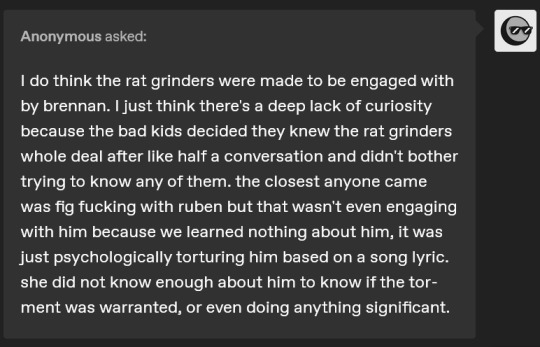
[id: ask reading "I do think the rat grinders were made to be engaged with by brennan. I just think there's a deep lack of curiosity because the bad kids decided they knew the rat grinders whole deal after like half a conversation and didn't bother trying to know any of them. the closest anyone came was fig fucking with ruben but that wasn't even engaging with him because we learned nothing about him, it was just psychologically torturing him based on a song lyric. she did not know enough about him to know if the torment was warranted, or even doing anything significant."]
I think both of you bring up a great point... in that regard kristen was the one who both interacted with AND emphasized with her foil the most. she had a lot of really good interactions with buddy dawn and that nat 1 at the beginning of the finale's combat will always haunt me. at the same time I cannot blame emily for not wanting to engage with ruben anymore like... she spent a ton of time this season rolling on ruben, trying to turn him. she made that 30 performance check and brennan told us we'd see the consequences of that later... and we didn't! if my DM didn't reward me consistently reaching out to and being curious about my foil I'd give up at some point too. like, the bad kids cast counterspell during frosty faire to protect ruben from grix - when ruben saw wanda childa during the finale fight he didn't even try to protect or counterspell anything for her. and that more than anything is why I found it all so disappointing. the way these kid were played in the battle didn't make them feel like the characters we've been interacting with all season - it's like nothing between them and the bad kids had an impact on them at all.
76 notes
·
View notes